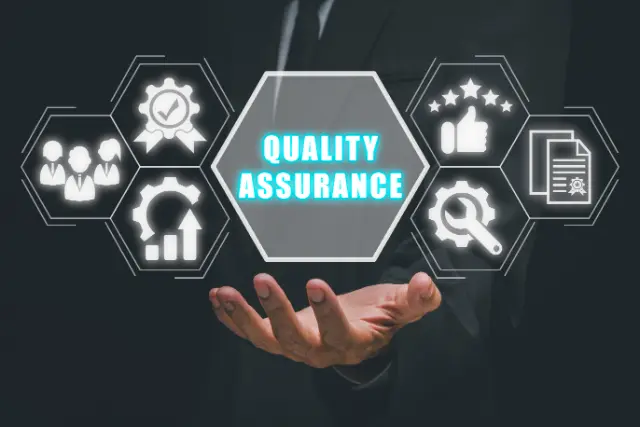Automating Quality Assurance and Audit Processes in Insurance
The insurance industry is facing increasing pressure to improve the efficiency and accuracy of its quality assurance and audit processes. These processes are essential for ensuring that claims are processed correctly, policies are compliant, and regulatory requirements are met. However, traditional methods of conducting these processes can be time-consuming and error-prone.
Quality Assurance and Audit Automation
Python, AI, and cloud-based solutions offer a powerful way to automate quality assurance and audit processes. These technologies can be used to:
- Streamline data collection and analysis: Automation can help to gather data from disparate systems and automate the analysis of that data. This can free up auditors to focus on more complex tasks.
- Identify and mitigate risks: Automation can help to identify potential risks and take steps to mitigate them. This can help to prevent errors and improve the overall quality of the audit process.
- Improve compliance: Automation can help to ensure that all audit processes are compliant with regulatory requirements. This can help to reduce the risk of fines and penalties.
- Generate audit reports: Automation can generate audit reports quickly and easily. This can help to improve the transparency of the audit process.
The Benefits of Automation
The benefits of automating quality assurance and audit processes are numerous. These benefits include:
- Improved efficiency: Automation can help to improve the efficiency of audit processes by reducing the amount of time required to complete them.
- Increased accuracy: Automation can help to improve the accuracy of audit processes by eliminating human error.
- Reduced costs: Automation can help to reduce the costs of audit processes by eliminating the need for manual labor.
- Improved compliance: Automation can help to improve compliance with regulatory requirements by ensuring that all audit processes are compliant.
- Better decision-making: Automation can help to improve decision-making by providing auditors with more accurate and timely information.
Conclusion
Automating quality assurance and audit processes is an essential step for insurance companies that want to improve the efficiency, accuracy, and compliance of their operations. Python, AI, and cloud-based solutions offer a powerful way to automate these processes and achieve these benefits.

Python, AI, and Cloud’s Role in Quality Assurance and Audit Automation
Python is a powerful programming language that is well-suited for developing both unattended and attended bots for quality assurance and audit automation.
Unattended bots can be used to automate repetitive tasks, such as data entry and analysis. This can free up auditors to focus on more complex tasks.
Attended bots can be used to assist auditors with tasks such as reviewing documents and identifying potential risks. Attended bots can be customized to meet the specific needs of each audit team.
Cloud platforms offer a number of advantages over traditional RPA/workflow tools orchestrators. Cloud platforms are more scalable, reliable, and secure. They also offer a wider range of features and functionality.
AI can be used to improve the accuracy and efficiency of quality assurance and audit automation. AI techniques such as image recognition, natural language processing (NLP), and generative AI can be used to:
- Identify and classify documents
- Extract data from documents
- Identify potential risks
- Generate audit reports
Benefits of using AI for quality assurance and audit automation
- Improved accuracy: AI can help to improve the accuracy of audit processes by eliminating human error.
- Increased efficiency: AI can help to improve the efficiency of audit processes by automating repetitive tasks.
- Reduced costs: AI can help to reduce the costs of audit processes by eliminating the need for manual labor.
- Improved compliance: AI can help to improve compliance with regulatory requirements by ensuring that all audit processes are compliant.
- Better decision-making: AI can help to improve decision-making by providing auditors with more accurate and timely information.
Conclusion
Python, AI, and cloud platforms offer a powerful way to automate quality assurance and audit processes. These technologies can help to improve the efficiency, accuracy, compliance, and cost-effectiveness of these processes.

Building the Automation
The first step in automating quality assurance and audit processes is to analyze the processes involved. This can be done by interviewing stakeholders, reviewing documentation, and observing the processes in action.
Once the processes have been analyzed, they can be broken down into a series of sub-processes. Each sub-process can then be automated using Python and cloud-based technologies.
Here are some examples of how Python and cloud-based technologies can be used to automate quality assurance and audit sub-processes:
- Data collection: Python can be used to extract data from a variety of sources, including databases, spreadsheets, and documents. This data can then be stored in a cloud-based data warehouse for further analysis.
- Data analysis: Python can be used to analyze data to identify trends and patterns. This information can then be used to improve the quality of the audit process.
- Risk identification: Python can be used to identify potential risks based on data analysis. This information can then be used to develop mitigation strategies.
- Report generation: Python can be used to generate audit reports that are compliant with regulatory requirements.
Data security and compliance
Data security and compliance are important considerations when automating quality assurance and audit processes. Python and cloud-based technologies offer a number of features that can help to protect data and ensure compliance.
For example, Python can be used to encrypt data at rest and in transit. Cloud-based technologies can provide secure storage and access controls.
Advantages of using Python for quality assurance and audit automation
There are a number of advantages to using Python for quality assurance and audit automation. These advantages include:
- Python is a powerful and versatile programming language. It can be used to develop a wide range of automation solutions.
- Python is open source. This means that it is free to use and distribute.
- Python has a large and active community. This means that there is a wealth of resources available to help developers learn and use Python.
Limitations of no-code RPA/workflow tools
No-code RPA/workflow tools can be a good option for automating simple tasks. However, they can be limited when it comes to automating more complex processes.
For example, no-code RPA/workflow tools may not be able to:
- Handle unstructured data.
- Perform complex data analysis.
- Identify and mitigate risks.
- Generate compliant audit reports.
Why Algorythum takes a different approach
Algorythum takes a different approach to quality assurance and audit automation because we believe that Python is the best language for developing these types of solutions. Python is powerful, versatile, and open source. It also has a large and active community.
We have found that our clients are dissatisfied with the performance of off-the-shelf automation platforms. These platforms are often limited in terms of functionality and scalability. They can also be expensive to implement and maintain.
Our Python-based solutions are designed to overcome these limitations. Our solutions are:
- Customizable: Our solutions can be customized to meet the specific needs of each client.
- Scalable: Our solutions can be scaled to meet the growing needs of our clients.
- Affordable: Our solutions are affordable to implement and maintain.
We believe that our Python-based approach is the best way to automate quality assurance and audit processes. Our solutions are powerful, flexible, and affordable.

The Future of Quality Assurance and Audit Automation
The future of quality assurance and audit automation is bright. As technology continues to evolve, we can expect to see even more powerful and innovative automation solutions.
Here are a few of the potential possibilities for extending the implementation of quality assurance and audit automation using other future technologies:
- Artificial intelligence (AI): AI can be used to improve the accuracy and efficiency of automation solutions. For example, AI can be used to identify and mitigate risks, and to generate compliant audit reports.
- Blockchain: Blockchain can be used to secure and track the data used in automation solutions. This can help to improve the transparency and accountability of these solutions.
- Quantum computing: Quantum computing could be used to accelerate the processing of large datasets. This could make it possible to automate even more complex and time-consuming processes.
We encourage you to subscribe to our newsletter to get more industry-specific automation content. You can also contact our team to get a free feasibility and cost-estimate for your custom requirements.
We believe that quality assurance and audit automation is essential for the future of the insurance industry. By embracing these technologies, insurance companies can improve the efficiency, accuracy, compliance, and cost-effectiveness of their operations.

Algorythum – Your Partner in Automations and Beyond
At Algorythum, we specialize in crafting custom RPA solutions with Python, specifically tailored to your industry. We break free from the limitations of off-the-shelf tools, offering:
- A team of Automation & DevSecOps Experts: Deeply experienced in building scalable and efficient automation solutions for various businesses in all industries.
- Reduced Automation Maintenance Costs: Our code is clear, maintainable, and minimizes future upkeep expenses (up to 90% reduction compared to platforms).
- Future-Proof Solutions: You own the code, ensuring flexibility and adaptability as your processes and regulations evolve.









